
Ingham County Pros. Carol Siemon with some of the lifers whose case are being reviewed.
“I think everyone should have an opportunity to get out some day”—Pros. Nancy Siemon
64 percent of Ingham County’s lifers are Black
Siemon joins national movement opposing life without parole (LWOP) sentences, termed ‘death by incarceration’
U.S. the only country in the world with true LWOP sentencing practice
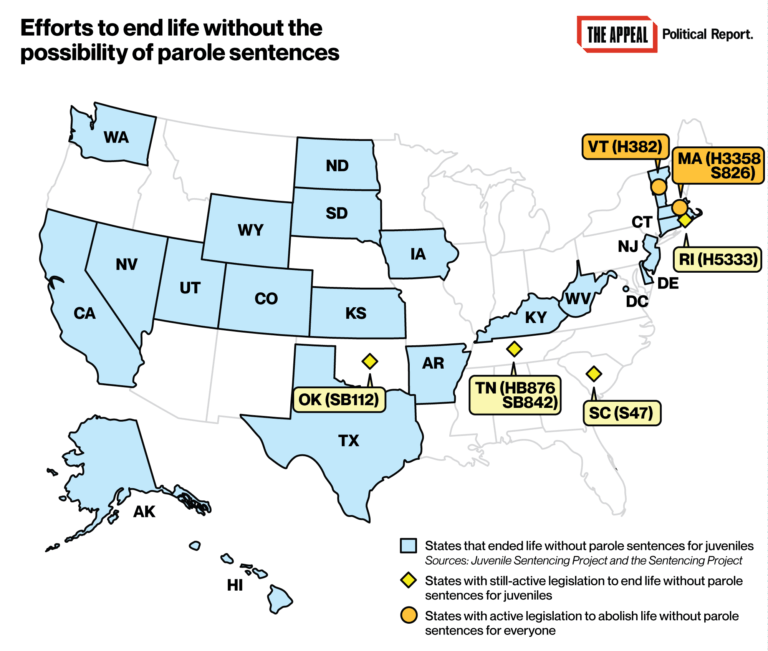
The states of Vermont, Massachusetts, Rhode Island, Tennessee, South Carolina, and Oklahoma all have state legislation pending that would end the inhumane practice of “death by incarceration.” Additionally, Sen. Sharif Street of Pennsylvania has re-introduced SB 542 to reform that practice there. “No more than 20 years” is the slogan of some of the state legislation, which is an actuality in most other countries in the world. The U.S. has 5 percent of the world’s population, but 25 percent of its incarcerated population.
 VOD: The article below is being re-published with some corrections (e.g. not all lifers are ‘murderers’ as original headline termed them, and some are actually innocent). It is important for Michigan residents to read about Pros. Siemon’s efforts, to encourage support here for the national anti-LWOP movement opposing “death by incarceration.” The states shown above all have active legislation that would bar LWOP for adults.
VOD: The article below is being re-published with some corrections (e.g. not all lifers are ‘murderers’ as original headline termed them, and some are actually innocent). It is important for Michigan residents to read about Pros. Siemon’s efforts, to encourage support here for the national anti-LWOP movement opposing “death by incarceration.” The states shown above all have active legislation that would bar LWOP for adults.
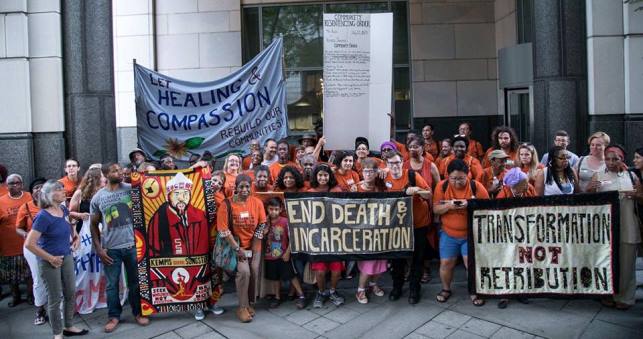
The Coalition to Abolish Death by Incarceration campaigns for SB 542, introduced by Pennsylvania State Sen. Sharif Street to outlaw life without parole sentences.
The anti-LWOP campaign was given a huge boost when the U.S. Supreme Court twice outlawed mandatory juvenile life without parole (JLWOP) in Miller v. Alabama (2012) and Montgomery v. Louisiana (2016).
But Michigan and Louisiana are known as the two worst “outlier” states still violating those rulings. In Michigan, county prosecutors originally recommended renewed LWOP sentences for two-thirds of the state’s juvenile lifers, despite the fact that the USSC said “only the rarest child” should be sentenced to LWOP. At last report, 200 of the state’s original 360 juvenile lifers are still languishing in prison without re-sentencing hearings, eight years after Miller v. Alabama.
![]()
January 30, 2020
LANSING–Carol Siemon is all about second chances, even for convicted [lifers].
As the prosecuting attorney for Ingham County, Siemon knows her job is largely about ensuring justice is fairly served for about 290,000 local residents. Usually, that involves locking a lot of people behind bars, some for the rest of their lives. But this year, she could be asking Gov. Gretchen Whitmer to send [some] of them back home.
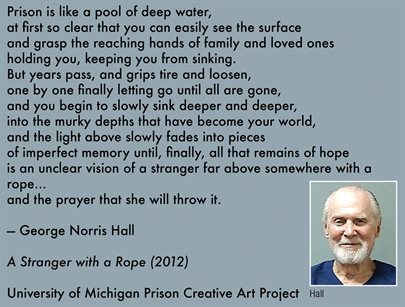
George Norris Hall, 84, is the oldest lifer in Ingham County. He was convicted in 1975 of the murder of three men during a card game.
“While I personally believe there are some people who should be in prison forever, like the Jeffrey Dahmer type of people, I just don’t believe in the death penalty,” Siemon explained. “I think life in prison without parole functions in a similar way, and I think everyone should have an opportunity to be able to get out some day.”
Siemon — with pro-bono help from former Assistant Attorney General Ron Emery — this year plans to begin a formal review of the 90 convicted murderers serving life in prison without parole in Ingham County. And for a select few, she said she plans to seek a gubernatorial commutation that could get them back out on the streets.
“It’s not whether or not they’re innocent,” Siemon told City Pulse. “We’re not saying that. But if they committed a homicide 40 years ago, who are they now? And do they deserve another chance? To my knowledge, nobody else is doing this type of thing in the state. It has just been something rolling around in my head.”
‘A progressive prosecutor’
In Michigan, only those convicted of first-degree murder or placing explosives causing injury can garner a sentence of life in prison without parole. And only the governor has the power to commute their sentences after the prisoners are reviewed and formally recommended for release by the 10-member Michigan Parole Board.
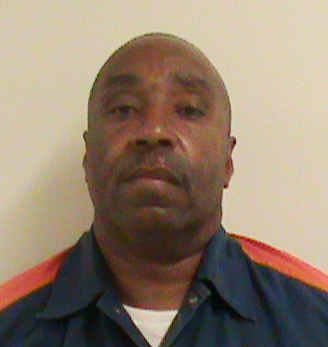
Bruce Edward Hicks was convicted of murder in Ingham County at 18. Now 62, he has spent more than 70% of his life in a prison cell. Michigan just passed legislation changing the maximum age for juveniles to 18. Under Miller v. Alabama, Hicks would have been eligible for a juvenile lifer re-sentencing.
After Siemon took office in 2017, she enacted policy to always offer defendants (even those accused of the most heinous crimes) a chance to plead guilty to a lesser charge like second-degree murder. Her goal: eliminate the possibility of life in prison without parole, instead putting prisoners before a review board within a few decades.
Other prosecutors before Siemon weren’t as lenient. And defendants don’t always take the deal before pushing their case to a trial. But that doesn’t mean some of them don’t deserve another shot at freedom, Siemon insisted.
“I just don’t like to exclude the possibility that someone can be rehabilitated,” Siemon said. “Families don’t always like it, and it can be very unpleasant — especially with victims’ families — but these people deserve it. Some don’t like that we offer it. We take those views into account, but it doesn’t mean they drive the decision.”
It’s typical for prosecutors to use their discretion when deciding on the severity of various criminal convictions; That’s just part of the job. But Siemon’s comparatively lenient and so-called “progressive” stance on offering plea deals to first-degree murderers is hardly the norm throughout the state of Michigan and the rest of the country.
And the differing prosecutorial philosophies largely toe the line between judicial rehabilitation and punishment.

Calhoun County Pros. David Gilbert
Calhoun County Prosecuting Attorney David Gilbert, a registered Republican, said he doesn’t have a similar policy in his office because some defendants can simply “deserve” to rot away in prison for the rest of their lives.
“Can they be rehabilitated? Maybe they can. But look at some of these cases where they put a gun to someone’s face and pull the trigger: Why should we take the chance? There’s not much you can do that is more personal than taking a human life,” Gilbert added. “That’s why we have these charges. We like to let the jury decide.”
“One never says ‘never’ or ‘always’ in our profession,” added Leelanau County Prosecutor Doug Donaldson. “That automatically ties your hands. And there are some out there that probably do deserve life in prison without parole. If the crime is cold and calculated, the concept of rehabilitation can essentially be a non-starter.”
Attorney General Dana Nessel also doesn’t condone a blanket policy toward watered-down murder charges. Without careful consideration, uniform plea deals can erode the legislative intent behind the harsh sentences written into state law. And plea deals to lesser charges aren’t always appropriate considerations, Nessel said.

State AG Dana Nessel was seen as allied with Whitmer during their campaigns.

Former Prosecutor Gov. Gretchen Whitmer has the only commutation power.
“Other times it is clear from the actions of the defendant as well as the criminal history of that individual that society should be protected from that person for the remainder of his or her life,” Nessel said. “However, each county prosecutor is duly elected by their county residents, and I respect Prosecutor Siemon and her rationale.”
Siemon declined to address criticism of her prosecutorial policies on plea deals, noting she doesn’t want to rally “unwarranted opposition” to her upcoming plans to seek commuted sentences for murderers. She recognizes that her policies aren’t for everyone, but maintains it’s the best way to ensure justice — including for defendants.
“When you’re a progressive prosecutor, you have people who will say things like ‘You hug thugs,’ or ‘You don’t care about victims.’ That’s not true. I care about the process being fair. We’ve learned that locking people up for a long time doesn’t always make the community more safe. It doesn’t serve a purpose other than vengeance.”
Rehabilitation vs. vengeance
Pushing her progressive prosecutorial policy a step further, Siemon last week told City Pulse that her office will soon begin a formal review of every life sentence doled out in Ingham County since 1975. And those who display the most rehabilitative progress — pending Whitmer’s eventual approval — might soon be set free.
In addition to the severity of the crime, attorneys will look at prisoners’ misconduct records and their participation in educational programs. Siemon’s office will also focus on defendants that were convicted of first-degree murder on the basis of being an accessory to the actual killing without literally pulling the trigger.
“The main question is whether we can truly feel they’ve been rehabilitated,” Siemon added.
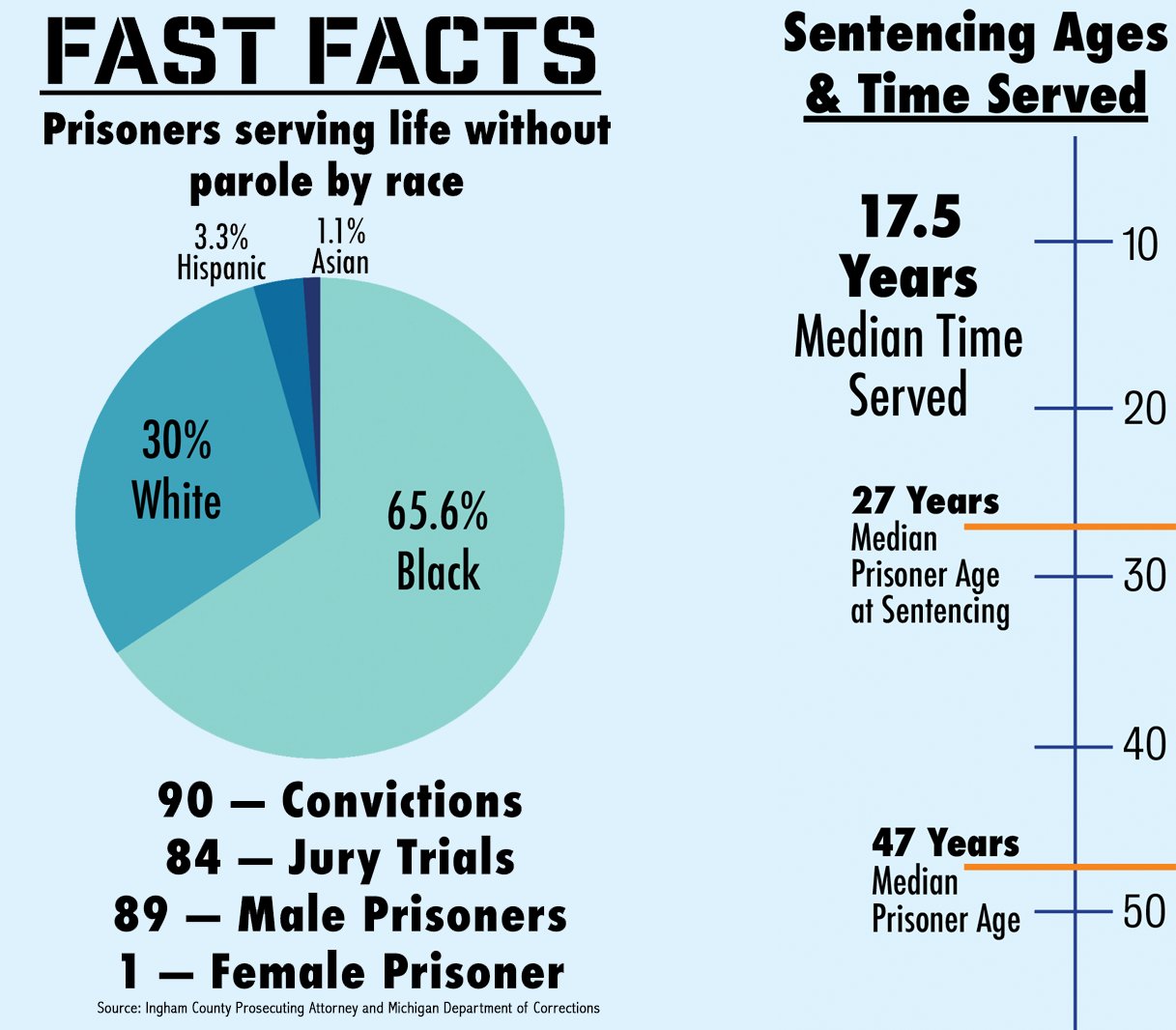 Siemon hasn’t established a precise timeline for the ongoing prisoner review process and noted that Emery theoretically could decide that none of the prisoners actually deserve to have their sentences commuted. If those recommendations make it to the governor’s desk, however, she’s confident that Whitmer will take action.
Siemon hasn’t established a precise timeline for the ongoing prisoner review process and noted that Emery theoretically could decide that none of the prisoners actually deserve to have their sentences commuted. If those recommendations make it to the governor’s desk, however, she’s confident that Whitmer will take action.
“I haven’t talked about it with her, but philosophically, I think she’d be on board with this,” Siemon added.
At least 90 people are serving life in prison without parole after they were convicted of first-degree murder in Ingham County in cases that date back to 1975, according to records obtained by City Pulse. An analysis cross-referenced with prison records shows the average lifer was sentenced at age 27, has served about 18 years and is now about 47 years old. All but one are men. Sixty-five percent are black. Thirty percent are white.
The oldest among them, 84-year-old George Norris Hall, was convicted in a brutal murder of three card players in an East Lansing basement, according to a newspaper clipping from 1975. The youngest, 24-year-old Marcell D’Jon Davis, was convicted in 2018 of a robbery and a murder outside of a marijuana dispensary in Lansing.

Marcell D’Jon Davis was 22 when convicted of murder.
About a third of those prisoners have spent more time behind bars than they’ve lived in the free world. Hall, for example, was convicted at 39 and spent the last 45 years in prison. Another inmate from Ingham County, Bruce Edward Hicks, was convicted of murder at 18. Now 62, he has spent more than 70% of his life in a prison cell.
“The severity of the crime used to be the only thing we really looked at,” Siemon said. “If someone committed a crime 20 years ago, however, that tells me who they were then. It’s not always who they still are now. I’ll make these decisions based on my own criteria, but it’s really all going to be about asking: Who are they now?”
But not everyone wants to bother to ask the question.
Gilbert said prisoners serving life in prison without parole from Calhoun County, for example, will remain there unless they personally seek to have their sentences commuted. Even then, it’s a long shot, he said. And besides, he said he’s not comfortable reviewing old convictions from former prosecutors that decided to levy the charges.
“I wasn’t there for these cases,” Gilbert added. “I’m not going to be the one to second guess them.”
A second chance
At a bench trial in 2017, an Ingham County circuit judge found 25-year-old Thomas McClellan guilty of first-degree murder, child abuse and arson in the stabbing (and burning) of his 5-year-old stepdaughter, Luna Younger. His first-degree murder conviction requires him to serve the rest of his life in prison without parole.

Thomas McClellan was 25 when he committed murder.
He wasn’t offered a plea deal to lesser charges, but that was before Siemon rolled out her new policies. And while his case likely won’t be up for a commutation review for at least another few decades, the possibility of his eventual release has touched a nerve with Younger’s family and those who leaned on his sentence for closure.
McClellan, according to reports in the Lansing State Journal, had stabbed Younger at least five times because she had interrupted his nap and asked for something to eat. He later piled blankets and paper towels on her body, then doused the pile in vodka and set it on fire before eventually surrendering to police just a few hours later.
Younger would’ve had her 9th birthday on Monday.
“It’s not my job to judge, but nobody won in that case,” said Jeanette Miller-Halmich, Younger’s grandmother. “What if he ended back on the street and did it again? I can forgive him, but that doesn’t mean he doesn’t need to pay for what he did. Nobody will understand the magnitude of the grief that we’re all still feeling over this.”
Others, like Paula McKay, who was a spokeswoman for Younger’s family at trial, have a different perspective.

Paula McKay Facebook
“I do feel that everyone has the ability to be rehabilitated, but I know a lot of people — including Luna’s mother — would feel differently,” McKay added. “My own husband would disagree with me; I know he would not like to see (McClellan) get out. But I’m a very strong Christian. These are just my feelings on the situation.”
In the last decade, at least 168 Michigan prisoners have had their sentences commuted by the governor, at least 44 of which had been convicted of first-degree murder, according to the Detroit Free Press. And only one of them went on to break the law and return to prison again, MDOC spokesman Chris Gautz told the Free Press.
Since 2011, commutations have been rare. There were at least 4,017 requests for commutation in Michigan under former Gov. Rick Snyder. He only granted six — all of which were for reportedly for medical reasons, according to data published in the Free Press. Whitmer’s office has yet to issue any gubernatorial commutations.
Absent an appeal, however, there’s no other formal mechanism or judicial precedent that grants adults serving life in prison without parole — like McClellan — another chance at freedom in Michigan. And Siemon said she feels a moral obligation to ensure those defendants’ sentences actually serve some form of rehabilitative purpose.
“I’m not here to do vengeance. It’s not my job,” Siemon added. “If you’re a prosecutor, it can be really hard to go against this sort of law and order because people think you don’t care but that’s simply not true. I do care.”

Gov. Whitmer signed legislation creating a commission on criminal justice reform in April, 2019.
In a statement last week, Whitmer’s office noted that her administration has taken “historic steps to reform our criminal justice system to better serve victims and treat offenders” and that an ongoing bipartisan movement in the state legislature continues to “review all aspects” of Michigan’s criminal justice system.
“They would be responsible for changing the laws surrounding life without parole,” according to the statement sent to City Pulse from Whitmer’s office. “All commutation requests are required to go through the process established by law which begins with the Michigan Parole Board, who reviews requests on a case-by-case basis.”
Siemon, the first woman to be elected prosecutor in Ingham County, defeated her Republican challenger Billi Jo O’Berry with about 58% of the vote in 2016. She plans to run for another four-year term this year. No challengers have surfaced. And she knows her prosecutorial philosophies might not align with some of the more conservative voices in the field — especially those that tend to lean more heavily on the punitive side of the scales of justice.
But it’s a risk she’s willing to take as she heads into another campaign cycle without a clear challenger.
“My promise when I ran in 2016 was that I will always try to do the right thing, no matter the fallout. That certainly has not changed,” Siemon said. “I endeavor to do what research and justice require — not what might make me more popular. I admire my fellow Michigan prosecutors even when we don’t always agree.”
Related stories:
THE INJUSTICE OF THIS MOMENT IS NOT AN ‘ABBERATION’–BLACK AGENDA REPORT
20 YRS. FOR WALTER SCOTT’S KILLER COP; LIFE (DEATH IN PRISON) SENTENCES UP 15X FOR OTHERS
WORTHY, OTHERS WANT LARGE PORTION OF ‘JUVENILE LIFERS’ TO DIE IN PRISON, DESPITE USSC RULINGS
https://www.freep.com/in-depth/news/local/michigan/2019/08/15/juvenile-lifers-michigan/1370127001/
https://truthout.org/articles/fighting-to-end-the-other-death-sentence-life-without-parole/
https://theappeal.org/death-by-incarceration-pennsylvania-photo-essay/
https://decarceratepa.info/oct2




